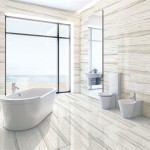Best Non-Slip Tile for Shower Floor: A Comprehensive Guide
Choosing the right tile for a shower floor is a critical decision, balancing aesthetics with safety. The shower environment is inherently prone to slips and falls due to the presence of water and soap. Selecting a non-slip tile is therefore paramount to ensure the safety and well-being of users. This article provides a comprehensive guide to understanding the characteristics of non-slip tiles and identifying the best options for a shower floor.
Understanding Slip Resistance Ratings
Slip resistance is a measurable property that indicates a tile's ability to reduce the risk of slipping. Various rating systems are used to quantify slip resistance, providing consumers with information to make informed choices. It's crucial to understand these ratings to accurately assess a tile's suitability for a shower environment.
Dynamic Coefficient of Friction (DCOF): The DCOF is a common measurement used in the United States, as defined by the American National Standards Institute (ANSI) A326.3 standard. DCOF measures the frictional force required to keep an object in motion on a wet surface. A higher DCOF value indicates greater slip resistance. For shower floors, a DCOF value of 0.42 or higher is generally recommended to meet safety standards. However, it's important to note that this rating is determined under controlled laboratory conditions and may not fully reflect real-world conditions with soap, shampoo, and body oils present.
R-Value (Ramp Test): Predominantly used in Europe, the R-value, determined by the German DIN 51130 standard, measures slip resistance by assessing the angle at which a person begins to slip while walking on a tile surface covered with oil. R-values range from R9 (lowest slip resistance) to R13 (highest slip resistance). For shower floors, tiles with an R11 or R12 rating are typically recommended, providing a significant degree of slip resistance.
Pendulum Test Value (PTV): This test, defined by the British Standards BS 7976, uses a pendulum-based device to measure the slip resistance of a surface. The PTV ranges from 0 to above 70, with higher values indicating greater slip resistance. A PTV of 36 or higher is often recommended for shower floors to minimize the risk of slips.
It's important to note that these rating systems are not directly interchangeable. Each test uses different methods and criteria, resulting in varying values. While these ratings are useful guides, consider other factors, such as surface texture and material properties, when selecting tiles for a shower floor.
Key Factors to Consider When Choosing Non-Slip Shower Tile
Beyond slip resistance ratings, several factors contribute to the overall safety and suitability of a tile for a shower floor. These include the tile's material, texture, size, and the grout used during installation.
Tile Material: Different tile materials offer varying degrees of natural slip resistance. Certain materials, due to their inherent properties, provide better traction than others.
Porcelain Tiles: Porcelain tiles are a popular choice for showers due to their durability, water resistance, and versatility in design. While smooth porcelain tiles can be slippery, textured porcelain tiles offer excellent slip resistance. Look for porcelain tiles with a textured finish, such as a matte, honed, or slightly rough surface. These textures increase friction and reduce the likelihood of slipping.
Ceramic Tiles: Similar to porcelain, ceramic tiles are durable and water-resistant, making them suitable for shower floors. However, ceramic tiles are generally less dense than porcelain and may be more prone to chipping or cracking. Textured ceramic tiles are also available and offer improved slip resistance. When selecting ceramic tiles, ensure they are specifically designed for wet environments and have a suitable slip resistance rating.
Natural Stone Tiles: Natural stone tiles, such as slate, travertine, and sandstone, often provide a naturally textured surface that enhances slip resistance. Slate, in particular, has a naturally cleft surface that offers excellent traction. However, some natural stone tiles may require sealing to prevent water absorption and staining. It is crucial to choose stone types with inherent texturing. Polished natural stone should generally be avoided in shower areas.
Mosaic Tiles: Mosaic tiles, composed of small tiles arranged on a mesh backing, offer several advantages for shower floors. The numerous grout lines provide increased traction, reducing the risk of slipping. Mosaic tiles are available in various materials, including porcelain, ceramic, and glass. When selecting mosaic tiles, opt for those with a matte or textured finish for optimal slip resistance. The smaller size of mosaic tiles also conforms better to the slight slope towards the drain often found in showers.
Tile Texture: The texture of a tile is a critical determinant of its slip resistance. Smoother tiles offer minimal traction, while textured tiles provide a more secure footing.
Matte Finish: Matte finish tiles have a non-reflective surface that provides excellent grip, even when wet. The subtle texture of matte tiles enhances slip resistance without being abrasive or uncomfortable to walk on.
Textured Finish: Textured tiles feature a raised pattern or irregular surface that increases friction. These textures can range from subtle ridges to more pronounced patterns. Textured tiles are highly effective in preventing slips and falls, but it is important to consider the cleanability of heavily textured tiles, as they can trap dirt and soap residue.
Honed Finish: Honed finish tiles have a smooth, matte surface that is achieved by grinding the tile's surface. Honed tiles offer a good balance of slip resistance and ease of cleaning.
Tile Size: The size of the tile can also influence slip resistance. Smaller tiles, such as mosaic tiles, typically offer better traction due to the increased number of grout lines. Larger tiles, on the other hand, have fewer grout lines and may be more prone to slipperiness. If using larger tiles, consider incorporating a textured finish or using a non-slip treatment to enhance slip resistance.
Grout Selection: The type of grout used can also contribute to the overall slip resistance of the shower floor. Epoxy grout is a durable, water-resistant option that provides a slightly textured surface. However, epoxy grout can be more challenging to install than cementitious grout. Cementitious grout is a more common and less expensive option, but it is more porous and may require sealing to prevent water absorption and staining. Regardless of the grout type, ensure that the grout lines are properly filled and maintained to provide maximum traction.
Recommended Non-Slip Tile Options: Materials and Types
Based on the factors discussed above, several types of tiles stand out as excellent choices for non-slip shower floors. These recommendations consider slip resistance, durability, aesthetic appeal, and ease of maintenance.
Textured Porcelain Mosaic Tiles: These tiles combine the benefits of porcelain's durability and water resistance with the increased traction provided by the numerous grout lines and textured surface of mosaic tiles. Look for porcelain mosaic tiles with a DCOF rating of 0.42 or higher or an R-value of R11 or R12.
Slate Tiles: Natural slate tiles offer a naturally textured surface that provides exceptional slip resistance. Slate is also durable and water-resistant, making it a long-lasting option for shower floors. Ensure the slate is properly sealed to prevent staining and water damage.
Textured Ceramic Tiles: Textured ceramic tiles provide a cost-effective alternative to porcelain tiles. Look for ceramic tiles specifically designed for wet environments with a textured finish and a suitable slip resistance rating. The textured surface can be achieved through various methods, including embossing or etching.
Honed Natural Stone Tiles (e.g., Travertine): Honed natural stone tiles, such as travertine, offer a smooth, matte surface that provides a good balance of slip resistance and aesthetic appeal. However, honed natural stone tiles may require sealing to prevent water absorption and staining. Choose a honed stone that is naturally porous, as this will provide more grip than a highly polished surface.
Epoxy Grouted Tiles: Regardless of the tile material chosen, using epoxy grout can significantly enhance the overall slip resistance of the shower floor. Epoxy grout provides a slightly textured surface and is highly resistant to water and stains, making it an ideal choice for wet environments. However, professional installation is generally recommended for epoxy grout.
Prior to making a final decision, it is recommended to obtain samples of the selected tiles and test them under wet conditions to evaluate their slip resistance. Simulating the shower environment by applying soap and water to the tile surface can provide a more accurate assessment of its performance.

Best Shower Floor Tiles Non Slip Ideas 2025 Updated Country Floors

Best Shower Floor Tiles Non Slip Ideas 2025 Updated Country Floors

Best Shower Floor Tiles Non Slip Ideas 2025 Updated Country Floors

Best Shower Floor Tiles Non Slip Ideas 2025 Updated Country Floors

How To Make A Tiled Shower Floor Less Slippery

Non Slip Bathroom Flooring Tile What To Choose Apollo

Shower Floor Tile Pebble Mosaic More The Shop

10 Best Shower Floor Tiles In 2025 The Ultimate Guide George Buildings

Shower Floor Tile Pebble Mosaic More The Shop

Anti Skid Tiles For Bathroom Kitchen Slip Floor Orientbell








